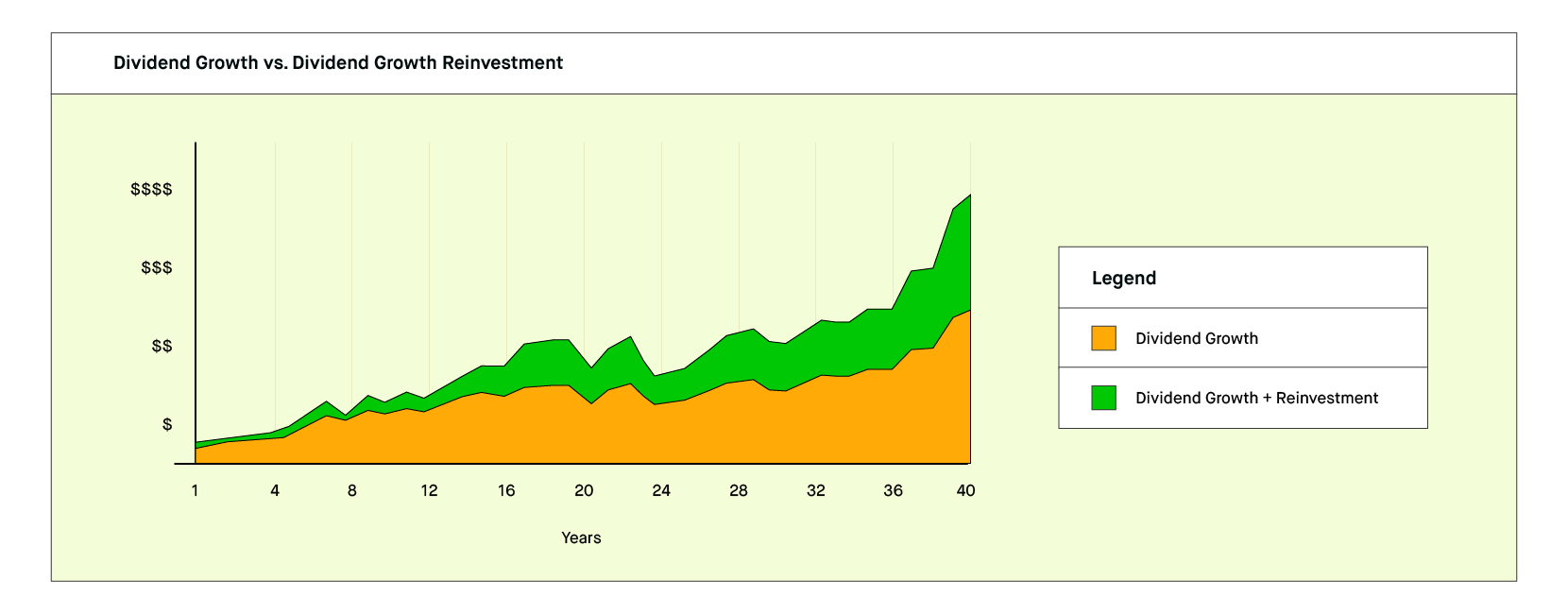What is a Dividend Reinvestment Plan (DRIP)?
A Dividend Reinvestment Plan, commonly abbreviated as DRIP, is an automatic investment plan that allows investors to use their dividends from a company to buy additional shares or fractional shares from that company.
🤔 Understanding a Dividend Reinvestment Plan (DRIP)
A Dividend Reinvestment Plan (DRIP) is a program that allows investors to use the cash dividends they receive from a company to buy additional shares or fractional shares in that company automatically. Through these plans, which are often offered by brokerage firms, you can choose to use the cash dividend you receive to buy additional shares in that company. This type of plan is sometimes also offered directly by a company to its shareholders. Of course, dividends are never guaranteed.
Let’s say the fictional Magical Creatures Cake Company (MCCC) has gone viral on Instagram with its new unicorn cupcakes and is now making enough profit to reward its investors with dividends. You own 100 shares in MCCC, currently valued at $10 each; so your stocks have a value of $1,000 altogether. Since MCCC determines to issue a dividend of 2%, you will receive a gross cash dividend of $20, or 2% of the value of your stocks. But if you have a DRIP set up, the dividend will be reinvested back into shares of the company.
Takeaway
A dividend reinvestment plan is like selling the apples from your orchard to buy more trees…
Just like a tree yields fruit, many stocks pay dividends. You can reap those dividends to consume now — eat the apples — or you can keep reinvesting for the future.
New customers need to sign up, get approved, and link their bank account. The cash value of the stock rewards may not be withdrawn for 30 days after the reward is claimed. Stock rewards not claimed within 60 days may expire. See full terms and conditions at rbnhd.co/freestock. Securities trading is offered through Robinhood Financial LLC. Futures trading offered through Robinhood Derivatives, LLC.
What are the pros and cons of DRIPs?
Dividend reinvestment plans (DRIPs) can offer many benefits to an investor, including the convenience of having your money invested for you automatically, and also the advantage of compounding your investment over a long period of time.
If you set up a DRIP with a company and your dividends are reinvested automatically, you’ll be able to take advantage of the company’s continuing success. The compounding effect of reinvesting dividends can be quite nice if the stock rises, but of course you should keep the flipside in mind: If the company’s stock value plummets, you will find yourself with compound losses.
Remember that DRIPs can be a reliable way to invest over time, but may require some belief in the particular company. That means DRIPs may not be the best idea if you shift your money from one stock to another fairly frequently, or if you plan on cashing out all of your stocks soon.
Finally, if you need your dividends in cash to pay your bills, you might not want to set up a DRIP. Always consider your investment objectives. All investments carry risk.
Do you have to pay taxes on DRIPs?
Depending on your particular situation and account type, you may have to pay taxes on any dividends you earn. If you have a DRIP set up, you may have to pay taxes on those dividends before they are reinvested in new shares.
How does a DRIP impact your investments?
Simply put, having a DRIP automates reinvestment in the companies you believe in without you having to manually make a trade. If you’re paid a dividend and want to reinvest it in stocks manually, you’ll have to calculate how much you can buy and place an order yourself and how much will be left over. If you simply automate this process, allowing your brokerage firm or DRIP provider to take your dividend and invest it in more shares, you’ll see the number of shares grow without having too much legwork.
DRIPs of course don’t guarantee a return. In fact, they could increase your losses if a stock’s price declines over the period during which you hold it. All investments carry risk.
How do DRIPs use dollar-cost averaging?
It can be tempting to cancel your DRIP if you see a company’s stock take a sudden nosedive. But remember that one of the side effects of a DRIP is dollar-cost averaging — that is, by buying the stock at various prices as your dividends are reinvested, you may benefit (at least a little) by buying some of your shares at the new, lower price.
Always consider your investment objectives. No one strategy is right for every investor. All investments carry risk.
How do you start a DRIP?
When it comes to setting up a DRIP, many investors find it helpful to start with what they already own and believe are good investments. That is, if you’re already investing in several different companies, you can ask your brokerage firm if they offer DRIPs.
You also can set up a DRIP plan with the touch of a button on many online brokerage accounts. You can often pick which dividend-yielding stocks you want to reinvest dividends into, and which ones you want to collect dividend cash payments from instead.
New customers need to sign up, get approved, and link their bank account. The cash value of the stock rewards may not be withdrawn for 30 days after the reward is claimed. Stock rewards not claimed within 60 days may expire. See full terms and conditions at rbnhd.co/freestock. Securities trading is offered through Robinhood Financial LLC. Futures trading offered through Robinhood Derivatives, LLC.

